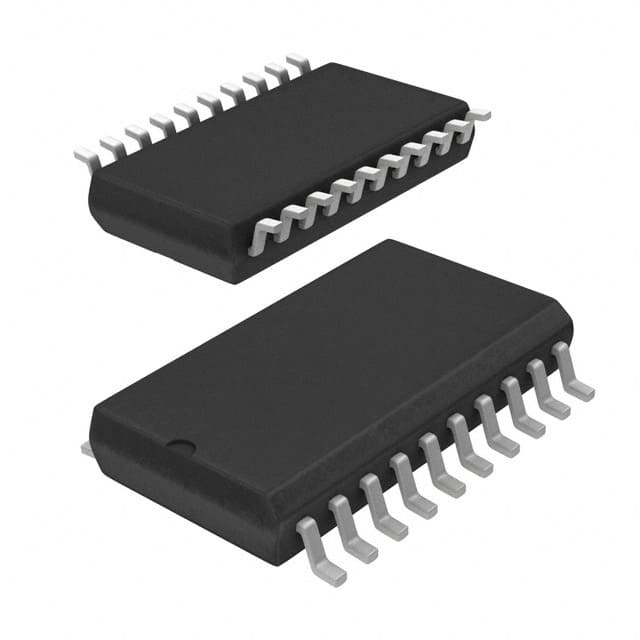Lihat spesifikasi untuk detail produk.

74LVTH244WM
Basic Information Overview
- Category: Integrated Circuit (IC)
- Use: Buffer/Line Driver
- Characteristics: High-speed, low-voltage, and low-power consumption
- Package: SOIC (Small Outline Integrated Circuit)
- Essence: Logic Level Translator
- Packaging/Quantity: Tape and Reel, 2500 units per reel
Specifications
- Supply Voltage Range: 2.7V to 3.6V
- Input Voltage Range: 0V to VCC
- Output Voltage Range: 0V to VCC
- Operating Temperature Range: -40°C to +85°C
- Propagation Delay Time: 4.5ns (typical)
- Output Drive Capability: ±24mA
Detailed Pin Configuration
The 74LVTH244WM IC has a total of 20 pins arranged in a dual in-line package (DIP). The pin configuration is as follows:
__ __
A1 |1 U 20| VCC
B1 |2 19| B2
A2 |3 18| A3
B3 |4 17| B4
A4 |5 16| A5
B5 |6 15| B6
GND|7 14| GND
OE |8 13| Y6
Y1 |9 12| OE#
GND|10 11| Y2
‾‾ ‾‾
Functional Features
- Logic Level Translation: The 74LVTH244WM is designed to translate signals between different voltage levels, making it suitable for interfacing between devices operating at different voltage levels.
- High-Speed Operation: With a propagation delay time of 4.5ns, this IC ensures fast signal transmission and response.
- Low-Voltage Operation: The IC operates at a low voltage range of 2.7V to 3.6V, making it compatible with modern low-power devices.
- Output Drive Capability: The IC can drive ±24mA of current, allowing it to interface with various loads.
Advantages and Disadvantages
Advantages: - High-speed operation enables efficient signal transmission. - Low-voltage operation reduces power consumption. - Logic level translation facilitates compatibility between different voltage domains.
Disadvantages: - Limited output drive capability may not be suitable for high-current applications. - Requires careful consideration of input and output voltage levels to prevent signal distortion.
Working Principles
The 74LVTH244WM is based on CMOS (Complementary Metal-Oxide-Semiconductor) technology. It utilizes a combination of MOSFETs (Metal-Oxide-Semiconductor Field-Effect Transistors) to achieve logic level translation. The input signals are processed by the internal circuitry, which then drives the corresponding output pins based on the logical state of the inputs.
Detailed Application Field Plans
The 74LVTH244WM finds application in various fields where logic level translation and buffering are required. Some common application areas include: - Microcontroller interfacing - Data communication systems - Industrial automation - Automotive electronics - Consumer electronics
Detailed and Complete Alternative Models
- SN74LVTH244A: Similar functionality and specifications from Texas Instruments.
- MC74LVX244: Equivalent octal buffer/line driver from ON Semiconductor.
- CD74HCT244: Octal buffer/line driver with TTL-level compatibility from Texas Instruments.
(Note: This list is not exhaustive and other alternative models may exist.)
This entry provides an overview of the 74LVTH244WM integrated circuit, including its basic information, specifications, pin configuration, functional features, advantages and disadvantages, working principles, application field plans, and alternative models. It serves as a comprehensive reference for understanding and utilizing this IC in various electronic applications.
Sebutkan 10 pertanyaan dan jawaban umum terkait penerapan 74LVTH244WM dalam solusi teknis
Sure! Here are 10 common questions and answers related to the application of 74LVTH244WM in technical solutions:
Q: What is the 74LVTH244WM? A: The 74LVTH244WM is a high-speed octal buffer/line driver with 3-state outputs, commonly used in digital logic circuits.
Q: What is the maximum operating voltage for the 74LVTH244WM? A: The maximum operating voltage for the 74LVTH244WM is typically 5.5V.
Q: Can the 74LVTH244WM be used as a level shifter? A: Yes, the 74LVTH244WM can be used as a level shifter to convert signals between different voltage levels.
Q: What is the maximum output current of the 74LVTH244WM? A: The maximum output current of the 74LVTH244WM is typically around 24mA.
Q: Can the 74LVTH244WM drive capacitive loads? A: Yes, the 74LVTH244WM can drive small capacitive loads without any additional buffering.
Q: Is the 74LVTH244WM compatible with TTL logic levels? A: Yes, the 74LVTH244WM is compatible with both TTL and CMOS logic levels.
Q: Does the 74LVTH244WM have built-in protection against electrostatic discharge (ESD)? A: Yes, the 74LVTH244WM typically has built-in ESD protection to prevent damage from static electricity.
Q: Can the 74LVTH244WM be used in bidirectional data transfer applications? A: No, the 74LVTH244WM is a unidirectional buffer and cannot be used for bidirectional data transfer. For bidirectional applications, a different IC like a transceiver should be used.
Q: What is the typical propagation delay of the 74LVTH244WM? A: The typical propagation delay of the 74LVTH244WM is around 4.5ns.
Q: Can the 74LVTH244WM be used in high-speed applications? A: Yes, the 74LVTH244WM is designed for high-speed operation and can be used in applications with fast switching requirements.
Please note that the answers provided are general and may vary depending on specific datasheet specifications and application requirements.

